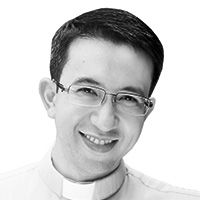What is happening to the world?

Rising temperatures which cause not just heat waves but alarming weather patterns, terrorist attacks calculated to instill fear and hate, random acts of violence which challenge our faith in humanity, political upheavals which make us ask if we have learned anything at all from history – you can probably add more to this list of doom and gloom just reading the past week’s headlines. Maybe the seemingly endless spate of bad news coming down on us was what spurred a lector in a parish where I help out to just blurt out (a few minutes before Mass began), “What is happening to the world?”
Taken aback, I was grateful that a quote from a Jesuit missionary in Japan came to my lips: “Trust in the river. It twists, it turns, but it always ends up in the ocean.” I felt quite pleased with myself, especially with the Zen-like calmness with which I said those words. To complete the effect, I closed my eyes and bowed my head. I was also hoping the lector would stop asking questions, but he was far from finished. “Trust in the river? That’s it? Just wait for the happy ending in the ocean? I am a patient man, but those twists and turns you talk about are not without collateral damage. People get hurt and die. What do you tell people who are suffering? Trust in the river?” Thank God the choir started singing the entrance hymn at that moment and we had to process down the aisle because I did not know how to respond to him.
Our Gospel today though may have the beginnings of an answer: “Are not two sparrows sold for a small coin? Yet not one of them falls to the ground without your Father’s knowledge. Even all the hairs of your head are counted. So do not be afraid; you are worth more than many sparrows” (Matthew 10:29-31).
I can imagine that lector countering, “That’s it? People are suffering, and everything is supposed to be okay just because we are assured that God knows about it?” To this objection, I would say, “Do not minimize this. That someone knows what you are going through can be one of the first steps to help you go through it.” William Perry, while journeying with a student dealing with pain and loss, learned much from what his student was able to realize, “If a loss has been known, if a pain of mine has been known and shared by somebody, if somebody has been aware of one of my pains, then I can go on. I can let that pain die in some way and go on to reinvest the hope” (see “Sharing in the Costs of Growth,” in Encouraging Development in College Students, 271).
And it is not just that God knows about what we are going through. God cares about what we are going through. And there is more. Two days ago, on the Feast of the Sacred Heart of Jesus, we heard our Lord say, “Come to me, all you who labor and are burdened, and I will give you rest. Take my yoke upon you and learn from me, for I am meek and humble of heart; and you will find rest for yourselves. For my yoke is easy, and my burden light” (Matthew 11:28-30). I can imagine the lector who started all of this objecting again, “God’s yoke is not easy. His burden is not light. The reason why we cannot find rest, why what is happening to the world is bothering us, is precisely because we have taken on his yoke and his burden.”
When Jesus talks about yokes and burdens, he is using the image of oxen plowing. In Jesus’ culture, an ox is never harnessed to a yoke alone. Always, another ox is there. Moreover, a younger ox is usually paired with an older, more experienced ox to serve as a guide. When Jesus says, “Take my yoke upon you and learn from me,” he is the telling us he is the other ox harnessed with us. We just have to keep in step with him. This is also how a heavy burden can be light. God knows. God cares. And God carries the burden with us.
I still have not answered the question, “What is happening to the world?” But knowing that God is with us as we take on the yoke of current events should change how we see what is happening to the world.
One final point: When Jesus says, “All the hairs of your head are counted,” and “You are worth more than many sparrows,” the your and the you are not in the singular but in the plural. This, I think, is significant not only because Jesus is talking to a group of people. This should remind me that God listens not just to my problems and concerns. God listens also to the problems and concerns of those who commit terrible acts of violence. God values not just my own opinions and positions; God values also the opinions and positions of those at the other end of the political spectrum. If we want to know what is happening in the world, maybe we should listen to other problems and concerns, too, and consider that different opinions and beliefs also have value. Maybe we can see that somehow, we are “yoked” to them, too. And in walking and pulling with them, maybe we can make all our burdens easier to bear.
- Latest
- Trending




























